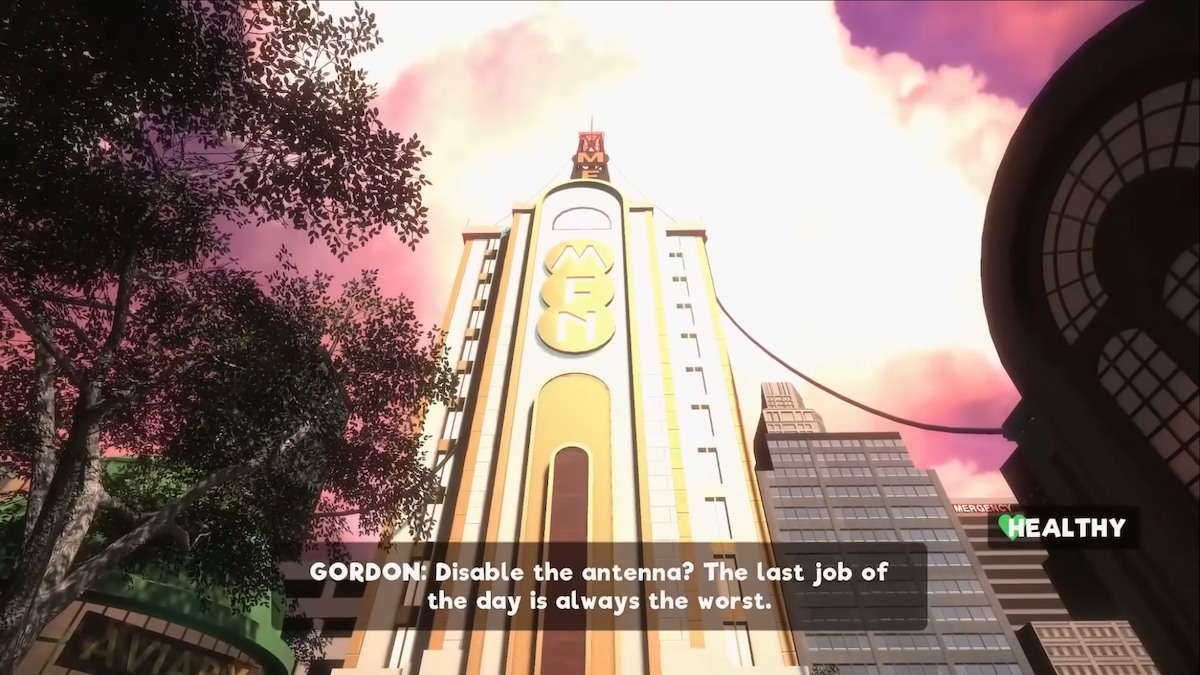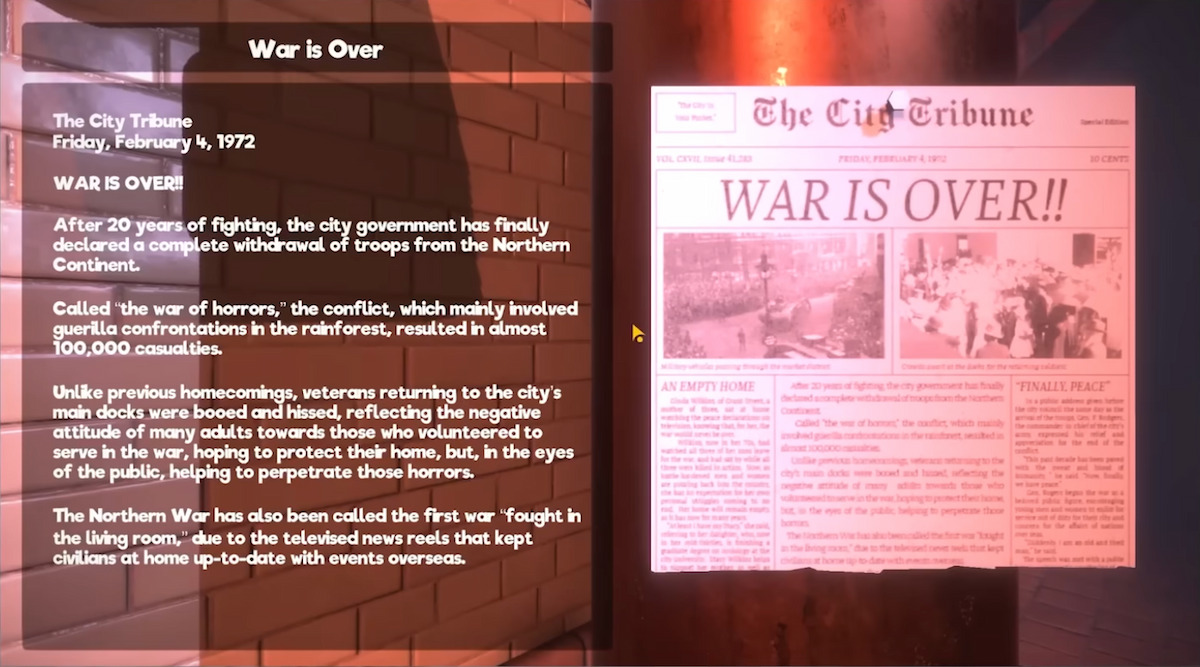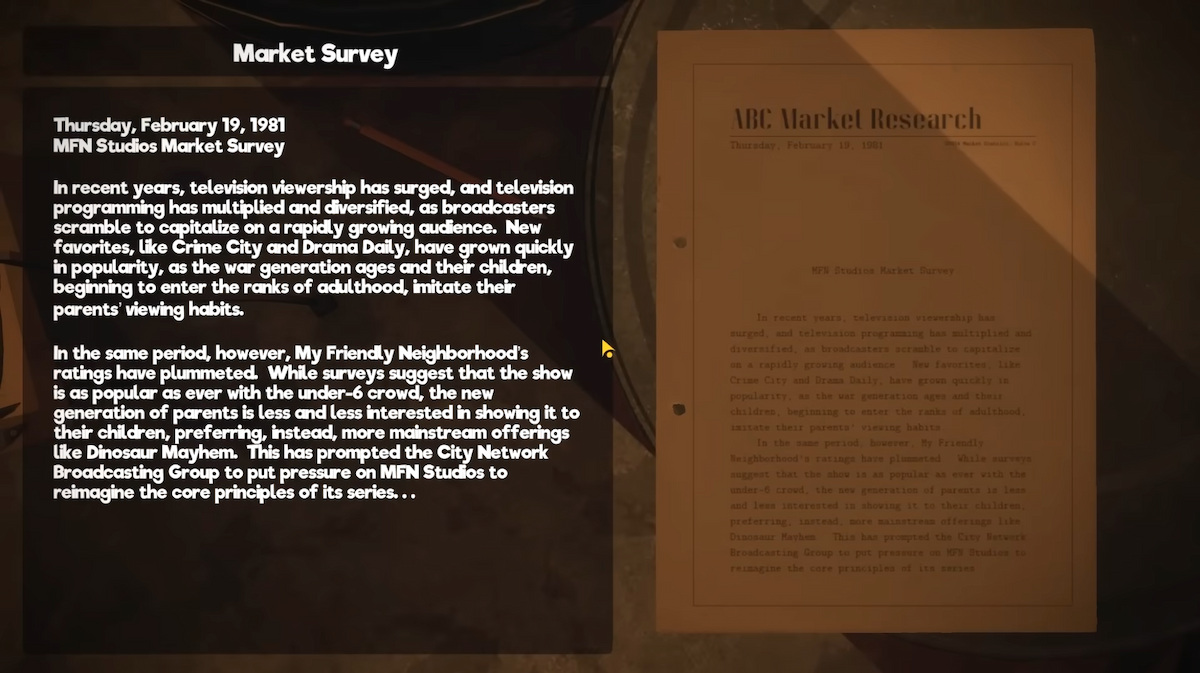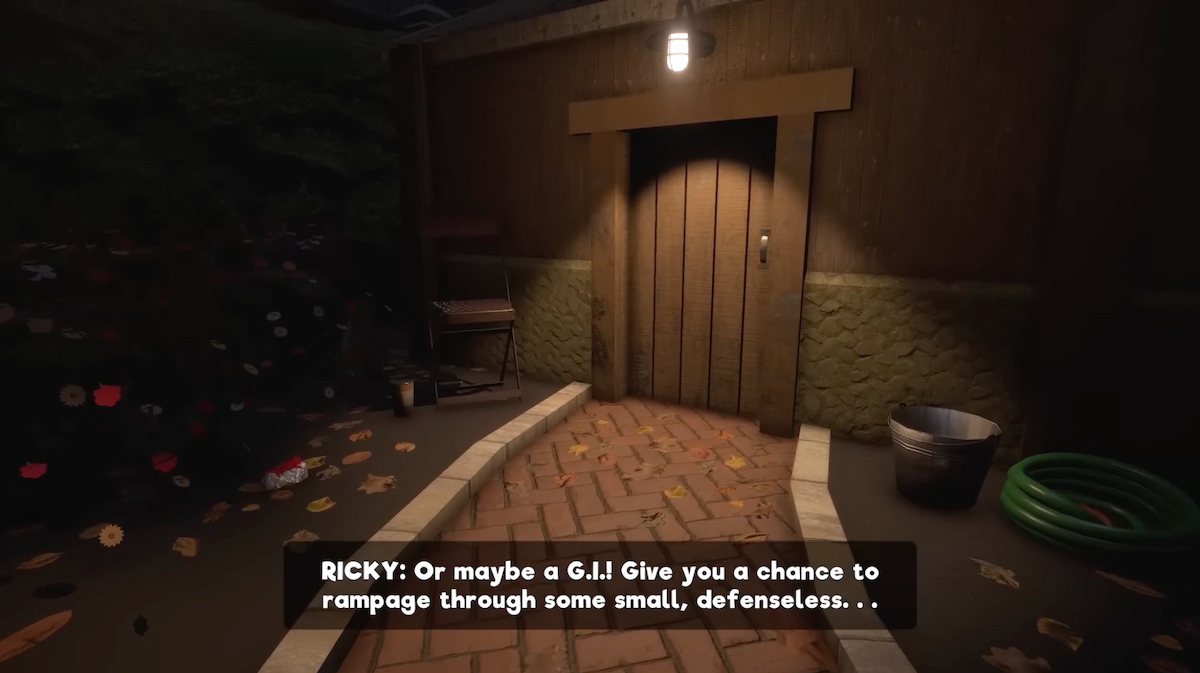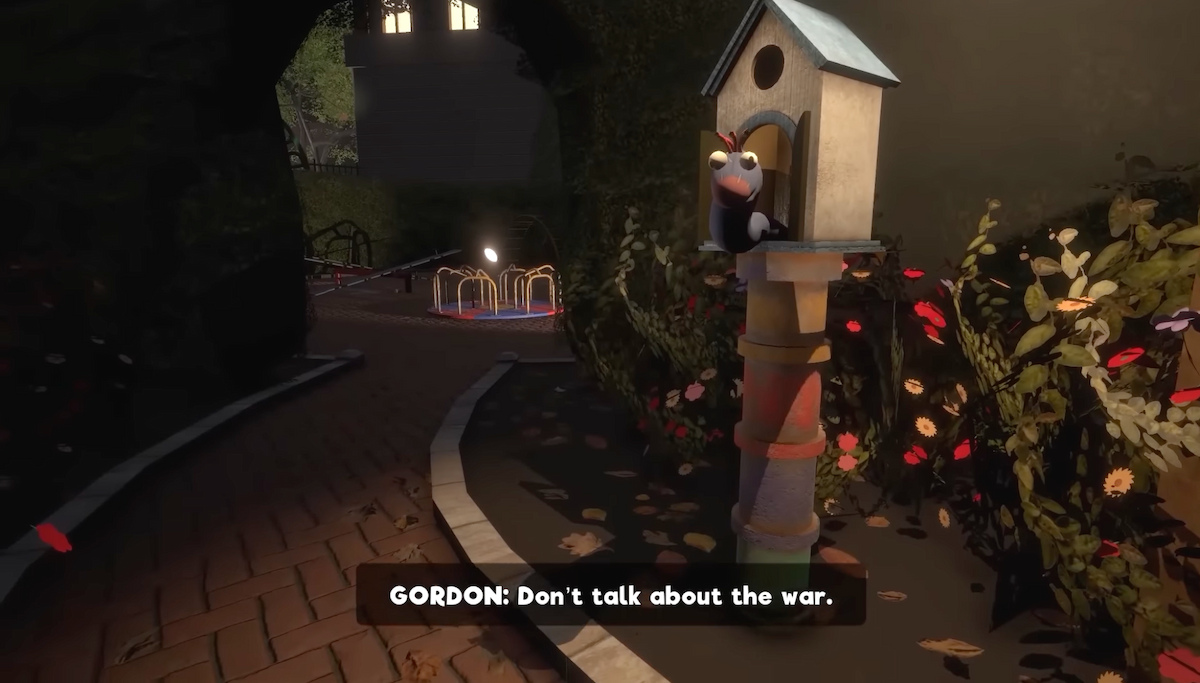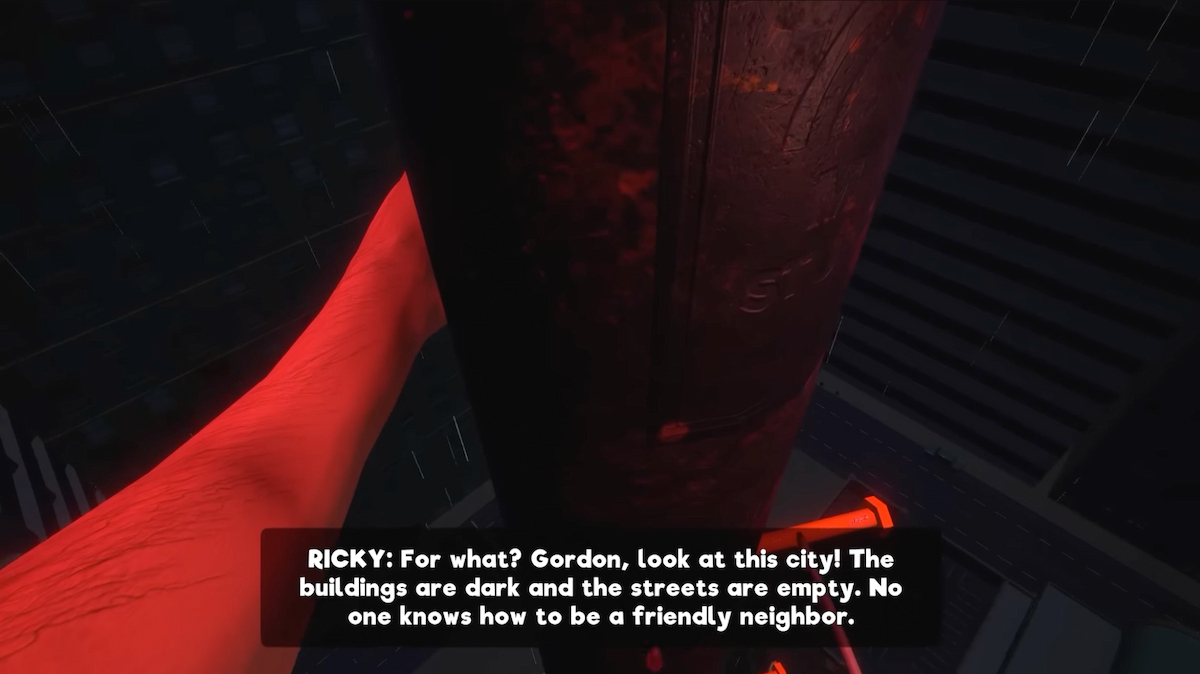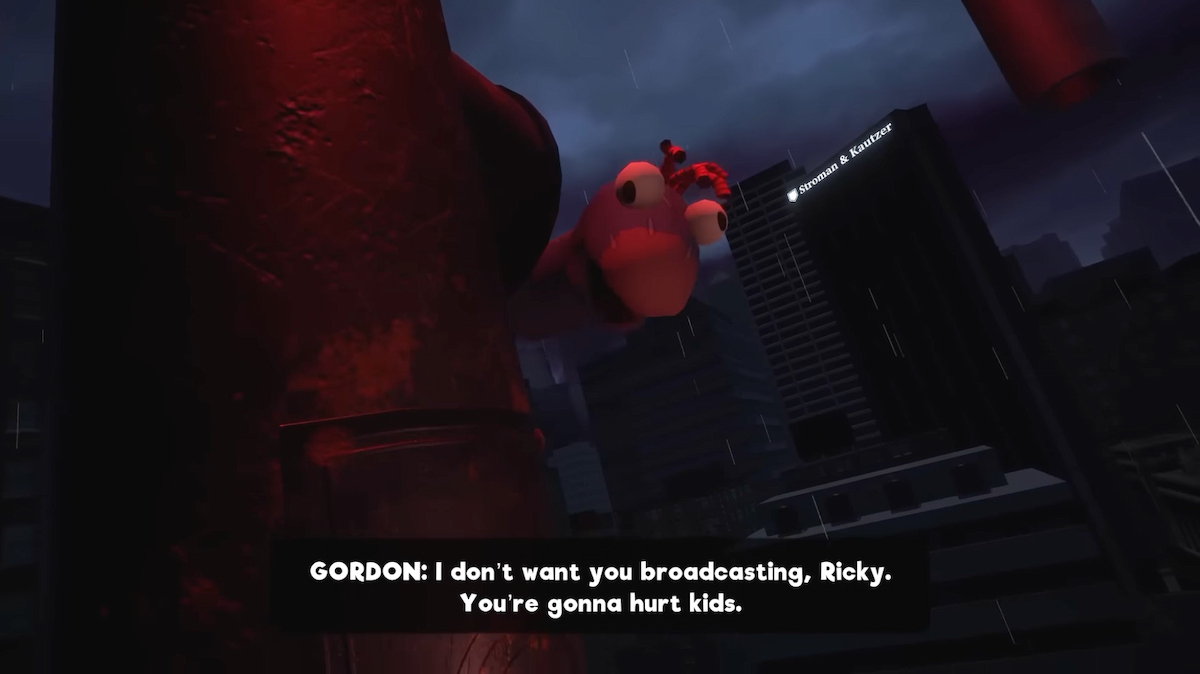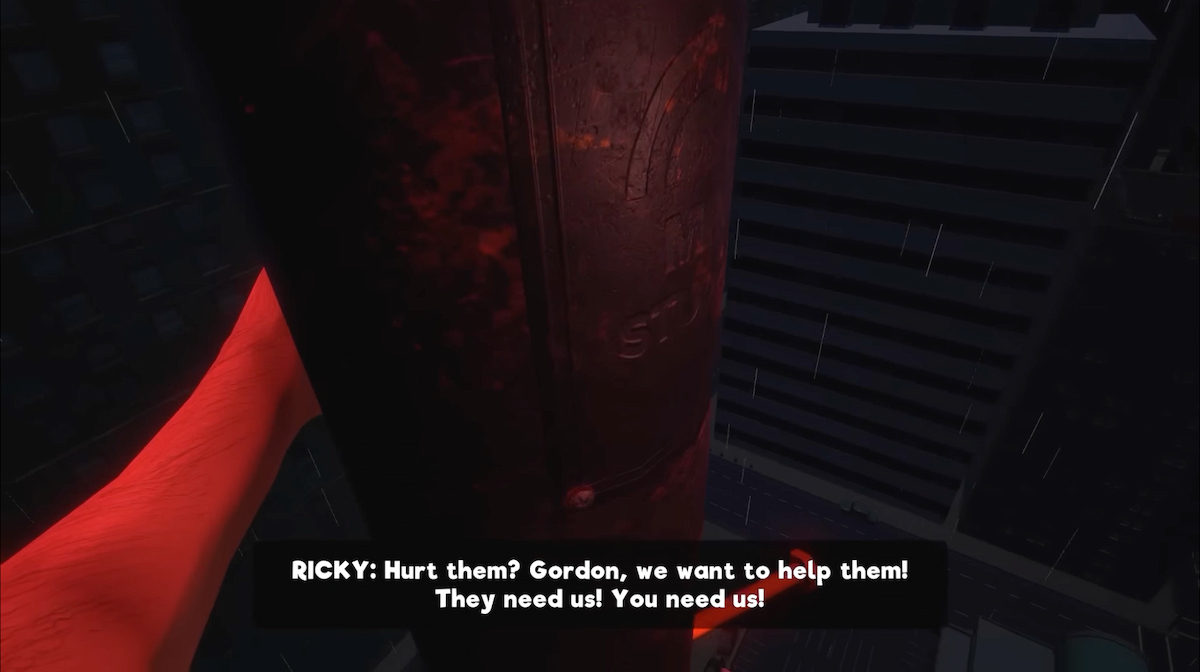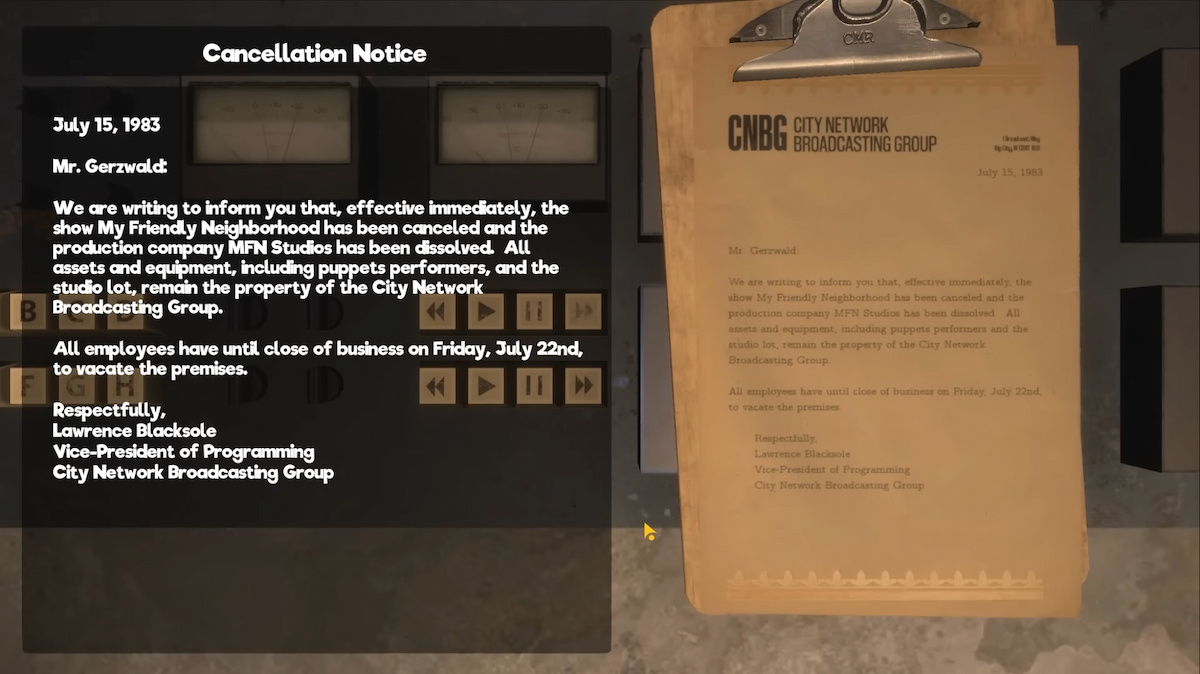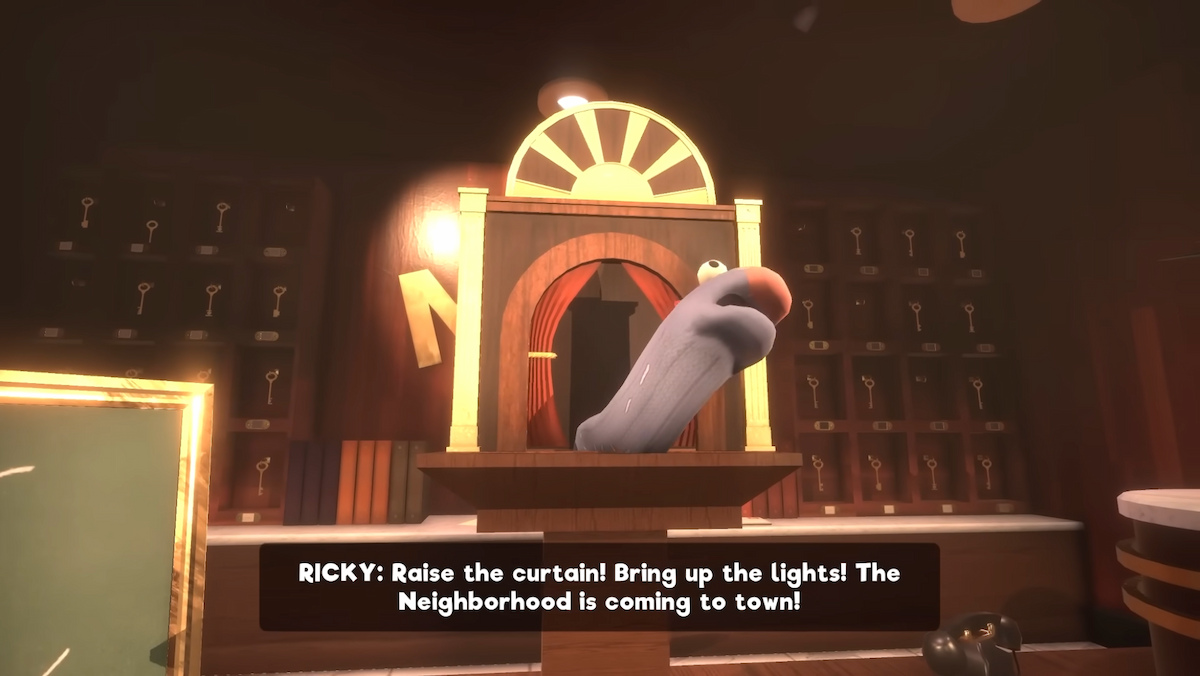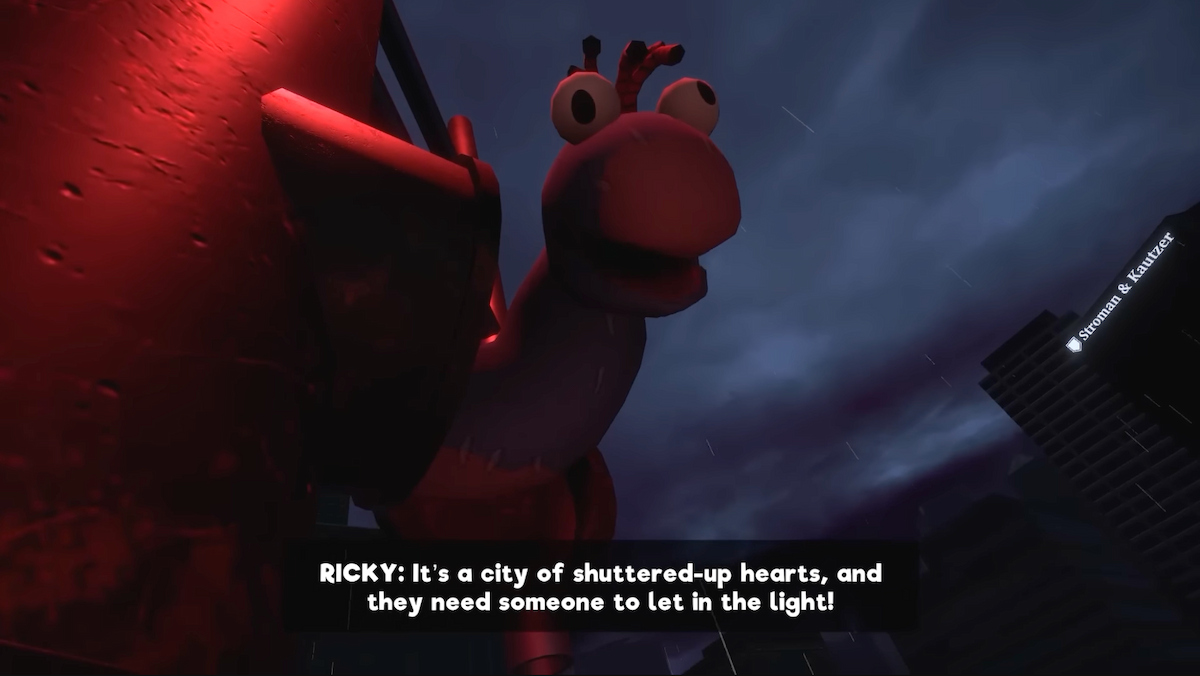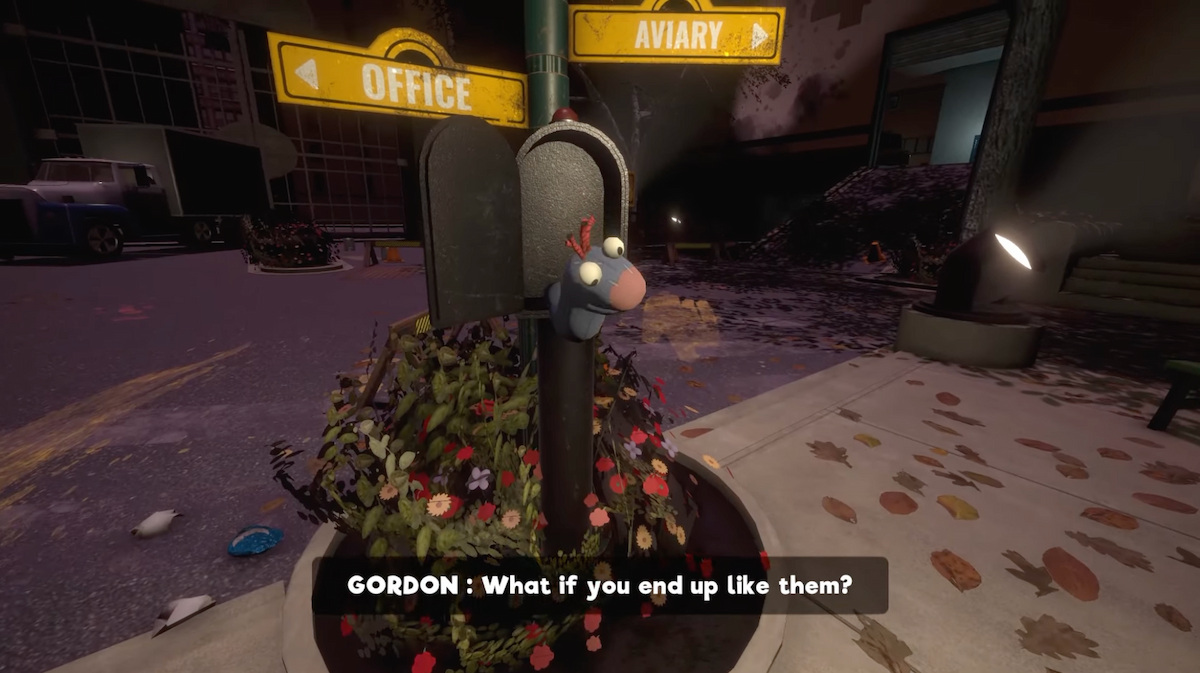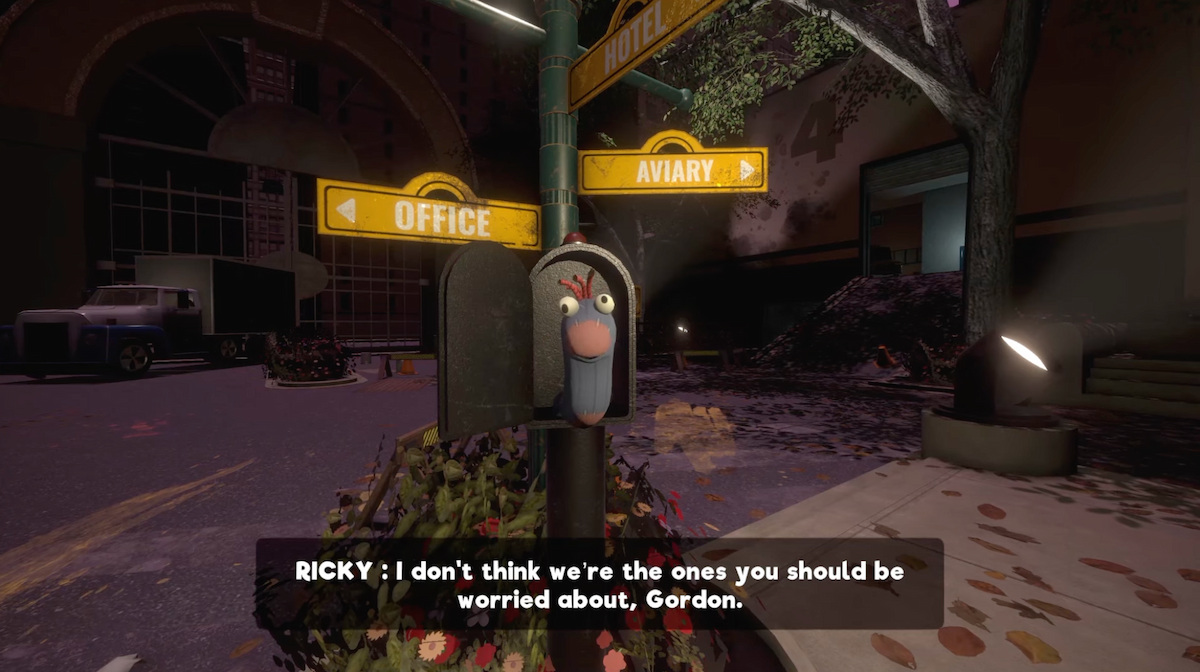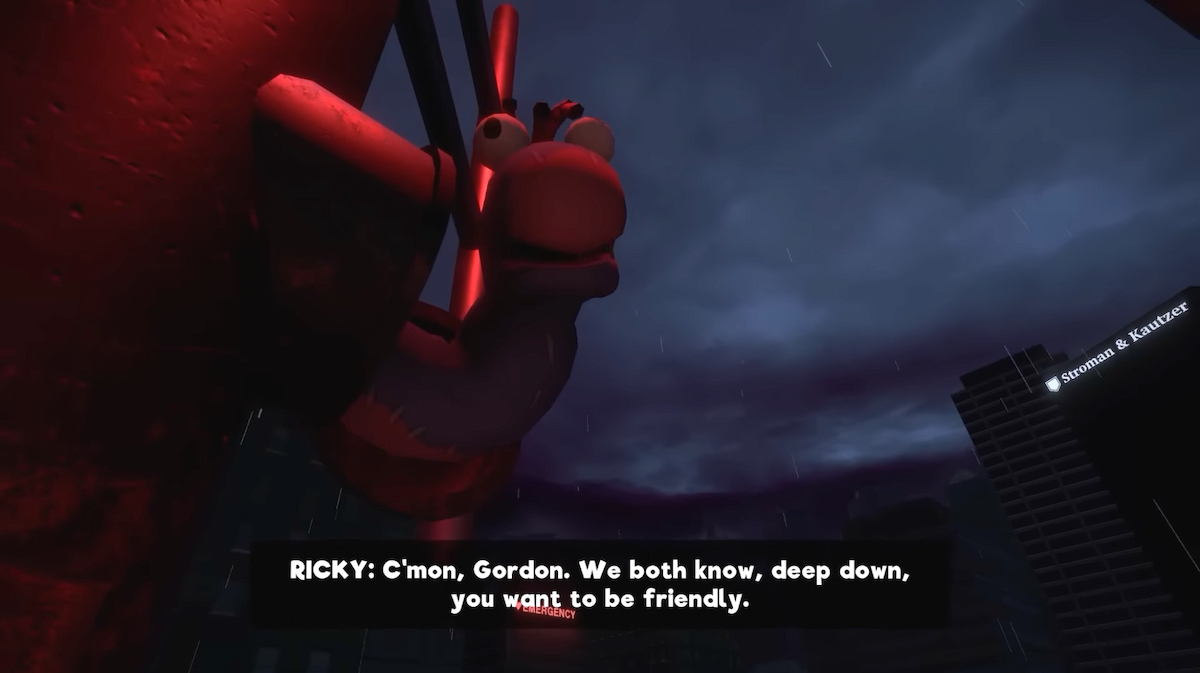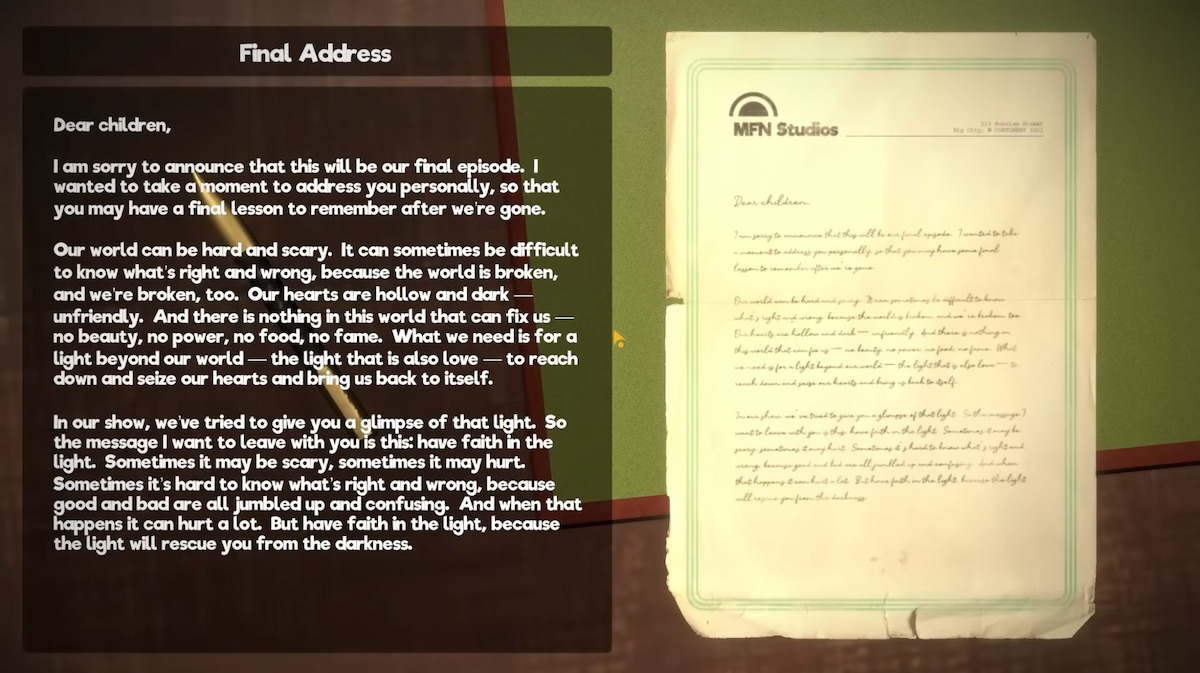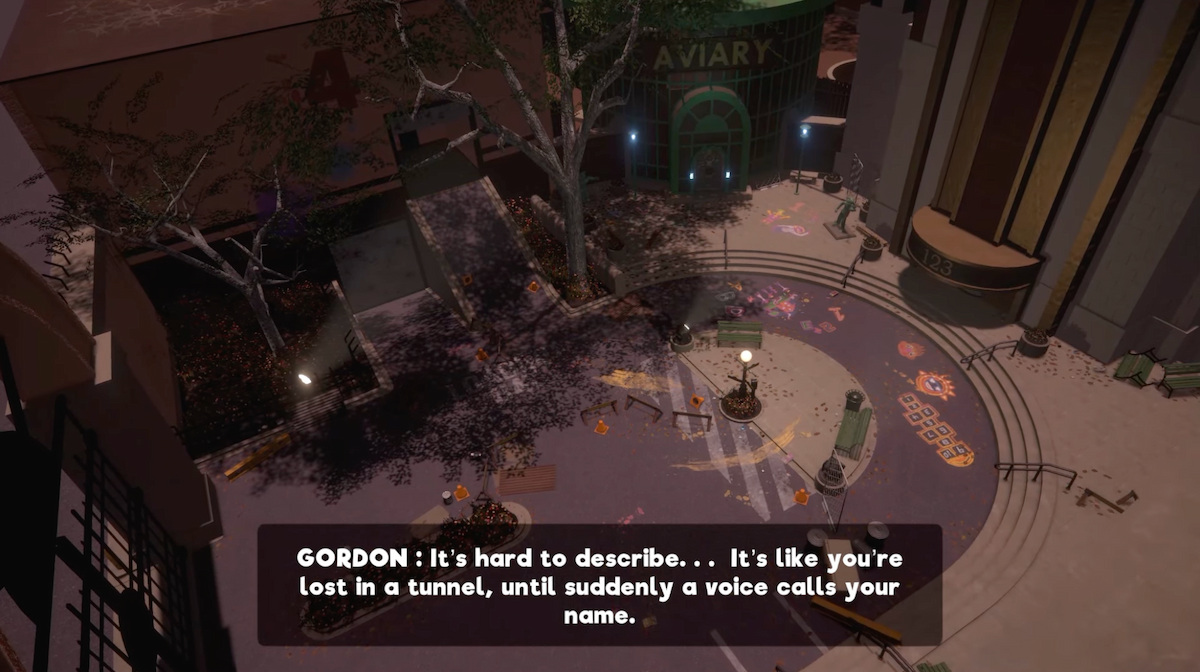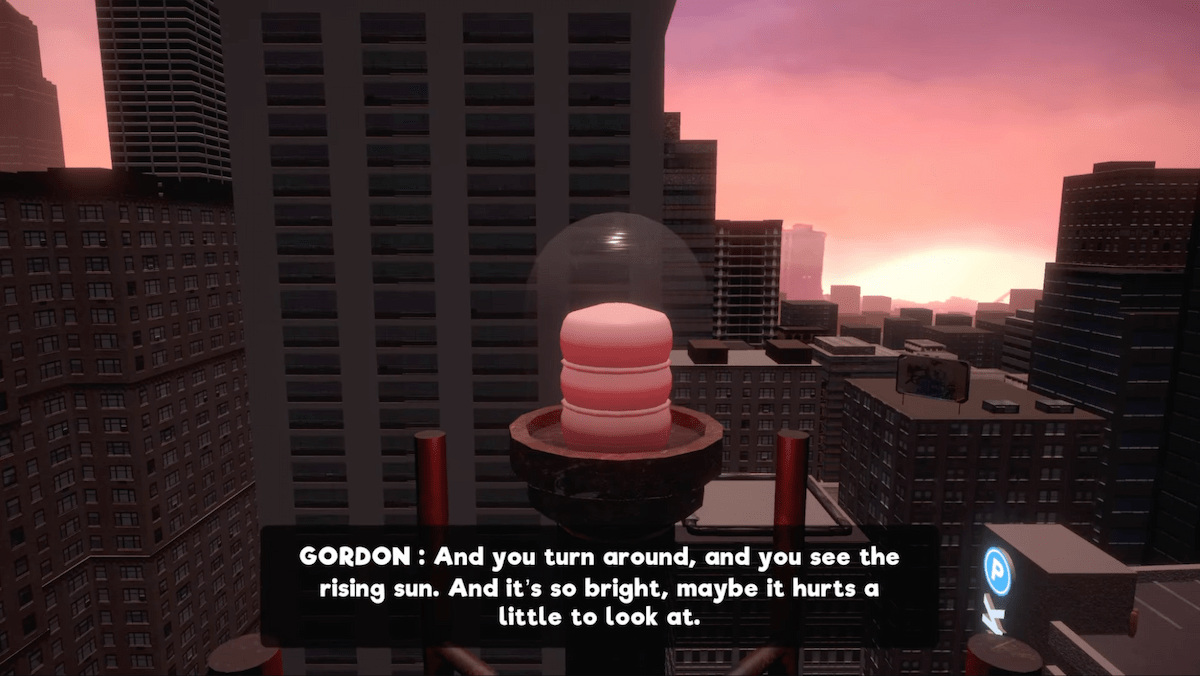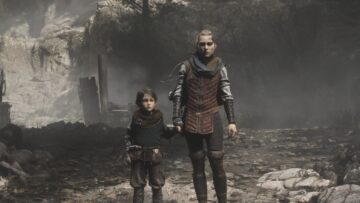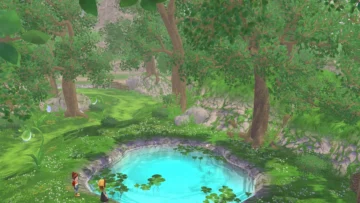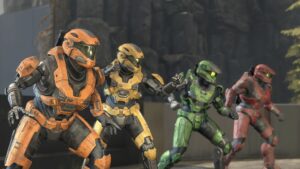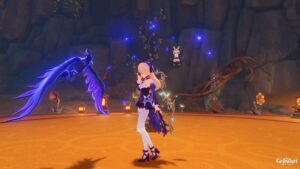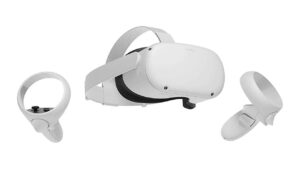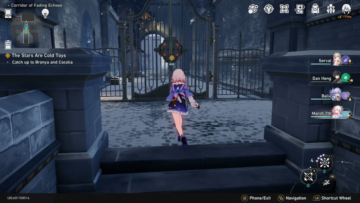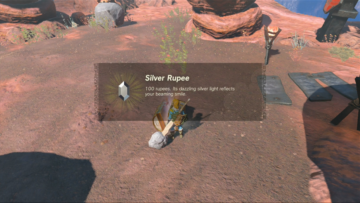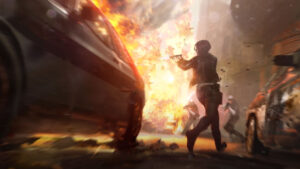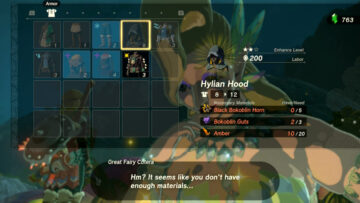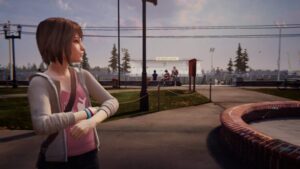My Friendly Neighborhood appears on the surface like it may be any other Mascot Horror game of the month. It has colorful but twisted childhood characters come to life. You have to contend with these characters. The story must be pieced together through notes. Playing through it once may not even allow you to figure everything out. But in truth, My Friendly Neighborhood has one of the more disturbing and hard-hitting stories in the entire genre. What it lacks in typical horror it makes up for in its harrowing story that struck me far more than I expected it to. This is the My Friendly Neighborhood story, explained in depth.
A word of warning: My Friendly Neighborhood isn’t a traditional horror game. It’s not covering content about possession, demons, monsters, or science experiments gone wrong. Instead it covers themes and parallels much closer to reality. Expect a discussion of trauma, war, and dehumanization.
My Friendly Neighborhood’s story, explained
The most basic premise of the story is simple enough. Puppets begin re-broadcasting their canceled show, called My Friendly Neighborhood, over the nightly news and disrupting it. You play as Gordon O’brian, a disgruntled and prickly middle-aged repairman on the verge of being fired. He’s sent to disconnect the signal from the broadcast tower before the end of his workday. Unfortunately, he has a horde of puppets and physical obstacles to deal with in order to achieve this objective.
#gallery-1 { margin: auto; } #gallery-1 .gallery-item { float: left; margin-top: 10px; text-align: center; width: 50%; } #gallery-1 img { border: 2px solid #cfcfcf; } #gallery-1 .gallery-caption { margin-left: 0; } /* see gallery_shortcode() in wp-includes/media.php */
- Images via DreadXP
Through notes found in the game, as most horror loves to do, the timeline and world building is pieced together. My Friendly Neighborhood was originally conceived in the 1960s by a man named Al Gerzwald as Ricky with Friends. The first episode aired on public access in 1968 and the show was beloved by audiences. It was picked up by the City Network Broadcasting Group, changing the show to its current name and relocating production to its hotel. Alas, despite years of episodes and even movie productions, its popularity gradually changed due to a world-shattering event.
The Northern War and its significance to the story
As we learn about in notes through the game, in this universe a war occurred on the northern continent, aptly named The Northern War. Referred to as ‘the war of horrors,’ this conflict, described as mostly guerilla warfare in the rainforest, went on for 20 years, from 1952 to 1972, the death toll ending up at almost 100,000. It was the first war to be widely broadcasted to the people at home. As a result, veterans coming home were demeaned for volunteering, seen as keeping its horrors going.
Given the timeline, description of rainforest guerrilla warfare, and its identical lasting period, it’s an obvious parallel to the Vietnam War, a war that changed how war was covered, no longer focusing on heroic propaganda but on the true horrors and loss of life.
Much like how media in real life shifted from the innocent mediascape of the Hayes code and postwar era of the 50s, the Northern War made the jaded public fall out of favor with My Friendly Neighborhood. Television became dark, gritty, and negative. There was a push for crime and drama shows, to reflect the tastes of children growing up watching the war. The show is canceled in 1983 and the studio shut down, leaving the puppets sealed inside.
#gallery-2 { margin: auto; } #gallery-2 .gallery-item { float: left; margin-top: 10px; text-align: center; width: 50%; } #gallery-2 img { border: 2px solid #cfcfcf; } #gallery-2 .gallery-caption { margin-left: 0; } /* see gallery_shortcode() in wp-includes/media.php */
- Images via DreadXP
Gordon himself is all but outright stated to be a war veteran suffering from the horrors he experienced. His unapproachable attitude and unkempt, sad apartment seen in the endings show he’s clearly depressed and a lot of other things on top of that. This is why he wields the game’s nonlethal pistol, shotgun, grenades, and minigun with ease. He has experience with weapons.
In short, the harrowing backstory of the war set up the events of the story and its grim, hopeless world.
But it gets even worse.
The war isn’t the only thing working against the show and the world of My Friendly Neighborhood. The unnamed city the game takes place in went through an economic slump around the time of the cancellation. A big businessman named Ronald Richbaucher (a rather suspicious name to have in a game with a lot of historical parallels) of the company Nebuzaradan came in and started buying everything up. The company name choice is no coincidence. In real life, Nebuzaradan was the commander of Nebuchadnezzar’s guard who destroyed the Jewish Temple and deported them from their homeland. Richbaucher does something similar by acquiring real estate and evicting people from their homes in the city to prioritize profit.
Needless to say, the world in My Friendly Neighborhood is in all ways desolate, hopeless, and depressed. The puppets and their motivations become a lot more meaningful with this context in mind. They are not like, say, the puppets in Hello Puppets!, who want to take over the world with their broadcast. In fact, they’re quite the opposite. They have good reason to be wanting to bring their hopeful children’s show back to the people.
#gallery-3 { margin: auto; } #gallery-3 .gallery-item { float: left; margin-top: 10px; text-align: center; width: 50%; } #gallery-3 img { border: 2px solid #cfcfcf; } #gallery-3 .gallery-caption { margin-left: 0; } /* see gallery_shortcode() in wp-includes/media.php */
- Images via DreadXP
The puppets, explained
One critical detail to understanding this game’s story is that the puppets are not supernatural. While practically every other Mascot Horror Indie Game in the genre has set us up to expect some kind of possession or experiment, in My Friendly Neighborhood’s universe, all puppets are naturally sentient. This is why Gordon does not react to any of them with the shock and surprise you’d expect. From his perspective, there’s nothing strange except for the fact they are all attacking him.
This opens the door to much more disturbing revelations about the nature of this universe. Despite their sentience, the puppets are legally treated as property of the show and nothing more.
This is why the building was shut down with absolutely no regard for them being left trapped inside as disregarded props. Plus, the in-game weapons are invented as a way to keep their lack of knowing their own strength in check. It’s implied that perhaps this is part of why they’ve grown to be more aggressive.
Unlike in most horror games, despite technically being antagonists, the puppets are by and large not malicious in nature. Being left with no humans to socialize with has rendered them over-excited and starved for company. The puppets seem to mimic or take most of their influence from the behavior of what they are exposed to. They calm when you’re nice to them, and treating them badly or exposing them to the horrors of the world makes them malicious. In that sense, they are much like the children they seek to influence positively through their show.
My Friendly Neighborhood story explained: The story in the present
The game takes place a decade after the closure of the hotel, in 1993. We don’t know how the puppets managed to rebroadcast the show by themselves, but they did.
Gordon meets the star of the show Ricky near the beginning, a sock puppet who repeatedly discourages him on his mission to shut down the broadcast. He claims they are trying to bring hope back to the people by broadcasting again, while Gordon seems set on simply doing his job.
However, through the journey into the hotel, Gordon helps several puppets along the way depending on the player’s actions. He can sit down with a depressed puppet upset at a cinematic reel of war footage and talk to her about his own magical experiences watching movies and the way it made him feel better. He can give sight back to a large bird puppet and tell her he knows it’s hard to look at yourself in the mirror sometimes (a line with far more under the surface, considering he is a war veteran). He’ll play a duet on a piano with a puppet despite not being able to read music and enjoy the small act of creative pursuit.
Yet even despite all this and repeated dissuasion from Ricky, Gordon still climbs to the top of the tower to stop the broadcast. He believes the puppets are trying to hurt the children.
He succeeds, but is thrown off the building by a lightning strike into the depths below the hotel. This is where we learn some of the puppets started watching television and became far more malicious as a result of all the dark and gritty material, and are soon greeted to a living amalgamation of puppet parts fused together we must fight or escape from.
The Conclusion
Related: How to get all endings in My Friendly Neighborhood
As Gordon escapes to the entrance of the hotel, Ricky expresses relief for his survival. He asks him to run the studio and help them get back on air. The player has the option to allow Gordon to accept or reject this offer.
#gallery-4 { margin: auto; } #gallery-4 .gallery-item { float: left; margin-top: 10px; text-align: center; width: 50%; } #gallery-4 img { border: 2px solid #cfcfcf; } #gallery-4 .gallery-caption { margin-left: 0; } /* see gallery_shortcode() in wp-includes/media.php */
- Images via DreadXP
In three of the four possible endings, Gordon will either refuse to help or help but leave the show behind. In the true ending, Gordon stays on the show and helps it take off again. He feels for the first time in a long time a little bit of hope within the city, and himself.
My Friendly Neighborhood story explained: This humble little horror puppet game is about the power of hope
Near the end of the game, you can find a note from Al Gerzwald himself about the cancellation of the show. In the most haunting text I have ever read in a horror game note, he writes that “the world is broken, and we’re broken, too. Our hearts are hollow and dark—unfriendly. And there is nothing in this world that can fix us; no beauty, no power, no food, no fame.” But he goes on to say, “What we need is for a light beyond our world—the light that is also love—to reach down and seize our hearts and bring us back to itself. In our show, we’ve tried to give you a glimpse of that light.”
This quote encapsulates the overall theme of the game very well. My Friendly Neighborhood is about something much more real than ghosts and demons underneath its silly, colorful puppet designs. The game explores the side of the coin that is media I feel is not explored as much anymore. In as much power as media has to distort and destroy, the opposite is true. The escapism and messaging of media can heal, teach, and inspire us to climb a little higher out of the dark pits life puts us in.
#gallery-5 { margin: auto; } #gallery-5 .gallery-item { float: left; margin-top: 10px; text-align: center; width: 50%; } #gallery-5 img { border: 2px solid #cfcfcf; } #gallery-5 .gallery-caption { margin-left: 0; } /* see gallery_shortcode() in wp-includes/media.php */
- The true ending of the game.
- Images via DreadXP
All in all, with the My Friendly Neighborhood story explained, it’s surprisingly deep and powerful for a mascot horror game of the month, don’t you think?
- SEO Powered Content & PR Distribution. Get Amplified Today.
- PlatoData.Network Vertical Generative Ai. Empower Yourself. Access Here.
- PlatoAiStream. Web3 Intelligence. Knowledge Amplified. Access Here.
- PlatoESG. Automotive / EVs, Carbon, CleanTech, Energy, Environment, Solar, Waste Management. Access Here.
- BlockOffsets. Modernizing Environmental Offset Ownership. Access Here.
- Source: https://www.pcinvasion.com/my-friendly-neighborhood-the-story-explained/
- 000
- 1
- 100
- 20
- 20 years
- a
- able
- About
- absolutely
- access
- achieve
- acquiring
- act
- actions
- address
- after
- again
- Against
- aggressive
- AL
- All
- allow
- along
- also
- an
- and
- any
- anymore
- ARE
- around
- as
- At
- attitude
- audiences
- auto
- back
- badly
- BE
- Beauty
- became
- become
- before
- begin
- beginning
- behavior
- behind
- being
- believes
- beloved
- below
- Better
- beyond
- BIG
- bird
- Bit
- border
- bring
- broadcast
- Broadcasting
- broken
- Building
- but
- Buying
- by
- called
- came
- CAN
- canceled
- Cancellation
- Center
- changed
- changing
- characters
- Children
- choice
- cinematic
- City
- claims
- clearly
- closer
- closure
- code
- Coin
- coincidence
- colorful
- come
- coming
- company
- conflict
- considering
- content
- context
- covered
- covering
- covers
- Creative
- Crime
- critical
- Current
- Dark
- deal
- death
- decade
- deep
- depending
- depth
- depths
- description
- designs
- despite
- destroy
- destroyed
- detail
- DID
- discussion
- do
- does
- doing
- don
- door
- down
- Drama
- DreadXP
- due
- ease
- Economic
- either
- end
- enjoy
- enough
- entire
- Entrance
- episode
- era
- escape
- estate
- even
- Event
- events
- EVER
- Every
- everything
- except
- expect
- expected
- experience
- experienced
- Experiences
- experiment
- experiments
- explained
- explored
- explores
- fact
- fall
- FAME
- far
- favor
- feel
- fight
- Figure
- Final
- find
- First
- first time
- Fix
- focusing
- food
- For
- four
- friendly
- Friends
- from
- full
- G
- gallery
- game
- Games
- Gaming
- Genre
- Get
- give
- glimpse
- goes
- going
- gone
- good
- Gritty
- Group
- Growing
- grown
- guard
- guerrilla
- Hard
- has
- Have
- he
- Hearts
- help
- helps
- her
- higher
- him
- his
- Historical
- Home
- homes
- hope
- hopeful
- Horror
- horror games
- hotel
- How
- HTTPS
- Humans
- Humble
- i
- identical
- if
- image
- Images
- implied
- in
- in-game
- Indie
- influence
- innocent
- INSIDE
- inspire
- instead
- into
- Is
- IT
- ITS
- itself
- Job
- journey
- jpg
- keep
- keeping
- kids
- kind
- know
- lack
- landscape
- large
- lasting
- LEARN
- leave
- leaving
- left
- legally
- Life
- light
- lightning
- like
- Line
- Little
- living
- Long
- longer
- Look
- loss
- lot
- loves
- made
- MAKES
- man
- managed
- margin
- Market
- May
- maybe
- me
- meaningful
- Media
- meets
- messaging
- mind
- mirror
- Mission
- monsters
- Month
- more
- most
- mostly
- motivations
- movie
- Movies
- much
- Music
- must
- my
- name
- named
- nature
- Near
- need
- negative
- network
- news
- Nice
- no
- not
- notes
- nothing
- notice
- objective
- obstacles
- obvious.
- occurred
- of
- off
- offer
- on
- once
- One
- ones
- only
- opens
- opposite
- Option
- or
- order
- originally
- Other
- our
- out
- outright
- over
- overall
- own
- Parallels
- part
- parts
- People
- perhaps
- period
- perspective
- physical
- Picked
- place
- plato
- plato data intelligence
- platodata
- platogaming
- play
- player
- Playing
- Plus
- popularity
- possession
- possible
- power
- powerful
- prioritize
- Production
- productions
- Profit
- Propaganda
- property
- public
- pursuit
- push
- quite
- quote
- rainforest
- rather
- reach
- React
- read
- Real
- real estate
- Reality
- reason
- reflect
- regard
- relief
- result
- Run
- Said
- say
- Science
- see
- seek
- seem
- seems
- seen
- Seize
- sense
- sent
- set
- several
- shifted
- Short
- shotgun
- show
- shows
- side
- sight
- significance
- similar
- Simple
- Simply
- Sit
- small
- socialize
- solid
- some
- something
- Soon
- Star
- start
- started
- starved
- stated
- still
- stop
- Stories
- Story
- strength
- strike
- studio
- suffering
- Surface
- surprise
- Survey
- Survival
- suspicious
- Take
- takes
- talk
- technically
- television
- tell
- text
- than
- that
- The
- The Game
- the world
- their
- Them
- theme
- themselves
- there
- These
- they
- thing
- things
- think
- this
- three
- Through
- time
- timeline
- to
- together
- too
- top
- traditional
- treating
- tried
- true
- truth
- typical
- under
- understanding
- unfortunately
- universe
- up
- us
- very
- veteran
- Veterans
- via
- Vietnam
- Volunteering
- want
- wanting
- war
- warning
- was
- watching
- way
- ways
- we
- weapons
- well
- went
- were
- What
- when
- where
- while
- WHO
- why
- widely
- will
- with
- within
- Work
- working
- world
- worry
- worse
- wrong
- years
- you
- yourself
- zephyrnet


